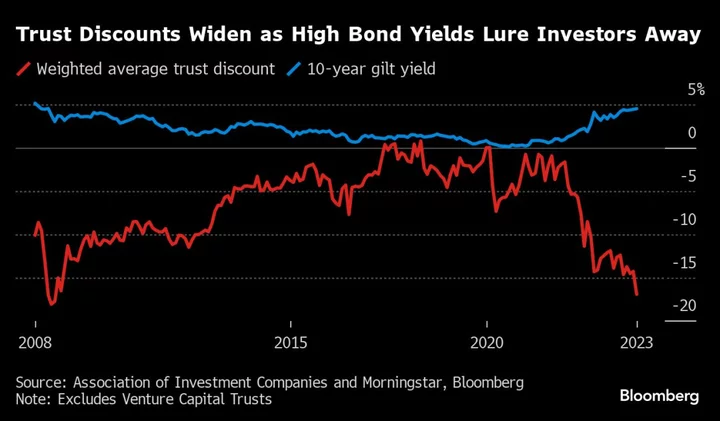In 1868, a British lawyer set up the first investment trust to pool together small sums of money to buy bonds issued by nations from Turkey to Egypt.
A century and a half later, the sector it spawned — closed-end funds traded on stock exchanges — is now worth about £260 billion ($318 billion). It enjoyed a boom in the era of record-low interest rates, more than doubling in size, with a simple pitch: high yields for the masses.
But now, central bank interest rates and bond yields are at multi-year highs and have ripped through markets around the world. Closed-end funds haven’t escaped the destruction and the allure of many is in rapid decline.
With even three-month gilts yielding more than 5%, investors have easier — and safer — ways to make money. The average UK trust is now trading at a 17% discount to asset value, the most since the 2008 financial crisis, according to the Association of Investment Companies and Morningstar.
That’s sparked the biggest shakeup in the industry in more than a decade: Fundraising has plunged and multiple funds are closing, or merging to build scale. The FTSE All-Share Closed End Investments Index is down 6% so far in 2024, lagging the broader market.
Among the high-profile victims is Hipgnosis Songs Fund, which is facing potential liquidation after royalty rights from the likes of Red Hot Chili Peppers and 50 Cent proved no match for surging rates.
“The biggest, most glaring structural threat is that at the moment the whole sector is on discount and no one can raise equity,” said Matt Hose, an analyst at Jefferies. “There will be quite a bit of creative destruction.”
Unlike mutual or exchange-traded funds, trusts — also called investment companies in the UK — raise funds by issuing shares but don’t have to meet redemptions. This enables them to take a longer-term view and put money into private assets, from music royalties — as in the case of Hipgnosis — to solar farms and student dorms.
Read More: Wall Street Managers Pile Into Closed-End Funds on Big Discounts
Until recently, trusts looked like a bright spot in London as other sectors receded amid a string of acquisitions and slump in new listings. Among the FTSE 350 Index, more than 80 members are trusts, compared with 44 a decade ago.
But now that trend is in reverse. Fundraising has dwindled to about £1.1 billion this year, the least in AIC data going back to 2006. And as funds shut up shop, they add to the exodus of firms from London’s stock exchange.
Not all trusts aim at generating income for investors. The universe of nearly 370 companies includes ones that seek capital growth by investing in everything from British small-caps to uranium miners and Vietnamese shares.
But the low-rate era saw a boom in trusts that put money in illiquid assets whose main appeal in a yield-starved world was a reliable dividend payout. A feature of British trusts is that they can retain a portion of income to smooth payouts through good years and bad.
For example, among the 22 trusts categorized as renewable energy infrastructure by the AIC, only 8 have track records of more than five years. Overall, the average dividend-paying company now yields 4.37% according to the AIC, about a percentage point lower than the rate on three-month UK Treasury bills.
“A lot of these weren’t around 10 or 15 years ago, so this is really the first time the structures have been tested in a rising interest-rate environment,” said Iain Scouller, an analyst at Stifel. “It’s going to be difficult for discounts to narrow in until we actually start seeing some of these gilt yields going down.”
That may take time because UK inflation is only slowly cooling, meaning the Bank of England plans to keep its benchmark rate elevated.
Exit Plans
So far this year to the end of October, about 17 trusts left the market or were on the path to doing so. Another 10 have announced plans to return cash, a typical precursor to shutting altogether, AIC data show.
Hipgnosis, whose music catalog includes Blondie and Neil Young, suspended its dividend payment to prevent it breaching covenants. The Round Hill Music Royalty Fund, a similar trust, was sold at a discount to its net asset value earlier this year. The £9.6 billion Scottish Mortgage Investment Trust reshuffled its board after a director criticized its management.
Trusts that invest heavily in unlisted assets have seen especially steep discounts — reflecting poor demand and in some cases fears that the value of their illiquid portfolio will prove lower than the current assessment, says Hose at Jefferies.
On the flip side, some arbitrageurs are spotting opportunities for bargains in the discounted prices. Boaz Weinstein's Saba Capital Management — already known for agitating for change at closed-end funds — has built a near 6% stake in the European Opportunities Trust, data compiled by Bloomberg show.
But there’s more to the existential crisis roiling UK trusts beyond a hawkish BOE.
The structure stands against the tides of global money management, which have seen massive inflows into cheaper, passive, liquid products run by financial giants.
Open-ended funds are now often cheaper than comparable trusts, said Nick Wood, head of investment fund research at money manager Quilter Cheviot. Mergers among wealth managers also mean there’s more appetite for larger funds, which is in turn spurring more combinations in the trust sector.
“Consolidation is unhelpful to the investment trust industry when it’s the buyers which are consolidating,” Wood said.
--With assistance from John Stepek.

